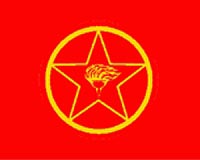| . |  |
. |
Sarkani, Afghanistan (AFP) Dec 20, 2009 For a month Afghan soldiers have guarded a bitterly cold mountain peak, coming under fire and keeping watch over an insurgent-infested valley near the Pakistan border. "Yesterday we were under attack all morning. They shot at us with machine guns and (Russian) dashakas," said the sergeant, decked out in new camouflage uniform and cradling an M-16, the US rifle slowly replacing the Kalashnikov. US soldiers from the 1st battalion, 32nd infantry regiment climb to Outpost Tango to take pictures and coordinates so that next time the Afghans can call in US artillery or air strikes. "We've come to help you plan indirect fire when the enemy is attacking," announces a fresh-faced lieutenant who has made the journey from a nearby US base. An Afghan soldier plays the flute in the background. US President Barack Obama's new strategy to beat back the Taliban is sending 30,000 extra American troops into combat to deny Al-Qaeda a safe haven and to train Afghan forces to take their place. Most are heading to southern Afghanistan, heartland of the Taliban militia that was ousted from power in the 2001 US-led invasion. But in the east, another dangerous part of the country where Taliban, Al-Qaeda affiliates and the local Hezb-e-Islami militia hold sway on the Pakistan border, the last year has already seen a "surge" of US troops. Results are beginning to show, said US officers from Task Force Chosin who are in charge of the southern part of Kunar province and about to return home after 12 months in combat. "We were the first surge. It was the first time there was a unit of this size in this area," said Lieutenant Colonel Mark O'Donnell. Initially the battalion was destined for Shiite slum Sadr City in Baghdad. Officers took Arabic lessons and their men were trained for urban combat. But three months before D-day, they were re-routed to Afghanistan, where none of the locals speak Arabic and urban combat training was of little immediate use in rural Kunar province. The unit lost six men during the year -- and only one in Kunar -- compared to 20 dead when they deployed to the Korengal valley, northern Kunar in 2006. Given that Afghanistan overall has been three times deadlier for US troops in 2009 than in 2006, the statistics are seen as encouraging. Commanders attribute lower death tolls to the decision to set up a string of combat outposts, such as Outpost Tango. US intelligence officers estimate that southern Kunar is sheltering around 200 insurgents -- foot soldiers from warlord Gulbuddin Hekmatyar's Hezb-e-Islami and the Taliban -- but that they operate in small packs. They have sanctuaries on both sides of the porous border with Pakistan, which slices through members of the same tribe. "We're working to help Afghan border police and Pakistani security forces to have more trust in each other," said O'Donnell. Obama's new strategy is increasing the pressure on Pakistan to fight militants on its soil. Many Afghans believe Pakistan sponsors insurgents. After years of neglect, another weapon in the arsenal is development. "Earlier we were more lethally focused. Now we're spending more and are more focused on governance, development, civilian representation. We're doing what should have been done earlier," said an intelligence officer. O'Donnell said US projects have created 2,000 jobs in Sarkani, a district of 26,000 people, as part of a "big civilian surge". "The problem is these jobs are not sustainable. There is no industry, no manufacturing," he said, after decades of war since the 1979 Soviet invasion. "The kids here grow up with the image of their father or grandfather who was a mujahedeen," said Captain Christian Lightsey. "They listen to glorious battle stories and the only job they can get is being a farmer, a driver or a shopkeeper. That's not that glorious," he said. "Then they go to a madrassa in Pakistan, they get a roof, clothes, food... and a rifle to fight the 'invaders'. It's an easy sell, it would work in America," he said. The commander on the ground, US General Stanley McChrystal, has said the most difficult task will be improving the credibility of government. "The problem is that the powerbrokers don't want to get rid of their power. Why would they empower the local government or the Afghan security forces if it means they are losing their own power?" says Lightsey. Share This Article With Planet Earth
Related Links News From Across The Stans
 Turkish army issues fresh warning over smear drive
Turkish army issues fresh warning over smear driveAnkara (AFP) Dec 17, 2009 Turkey's chief of staff Thursday lashed out at a "psychological campaign" to smear the army and warned of a "confrontation" over claims it was seeking to discredit and even oust the ruling party. His remarks followed suggestions that a deadly attack on soldiers last week might have been orchestrated to undermine the government. "Some circles have been carrying out a (...) psychological ... read more |
|
| The content herein, unless otherwise known to be public domain, are Copyright 1995-2009 - SpaceDaily. AFP and UPI Wire Stories are copyright Agence France-Presse and United Press International. ESA Portal Reports are copyright European Space Agency. All NASA sourced material is public domain. Additional copyrights may apply in whole or part to other bona fide parties. Advertising does not imply endorsement,agreement or approval of any opinions, statements or information provided by SpaceDaily on any Web page published or hosted by SpaceDaily. Privacy Statement |